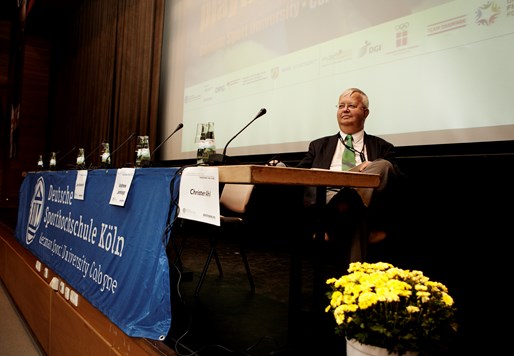Play the Game delegates call on the IOC to gather all stakeholders to draft a code for good governance in sport

Christer Ahl contributed to making the Cologne Consensus. Photo: Tine Harden
06.10.2011
By Kirsten SparreThe call is dubbed the Cologne Consensus as it was it adopted at the seventh Play the Game conference held at the German Sports University in Cologne, Germany. It came about after conference participants, including stakeholders and experts from over 40 countries, had been discussing a number of issues threathening the credibility of sport, including corruption, bad governance and match fixing.
"The fundamental integrity and credibility of the sports movement is at stake, and this is weakening the role of sport as a positive force in society. Existing principles, mechanisms and institutions to enhance good governance and counter corruption have proved inadequate," the Cologne Consensus reads.
The consensus was adopted in order to move the debate forward and ensure that action is taken. It invites international sports federations and the IOC to take the lead in making the necessary changes by organising a conference for all relevant stakeholders that should look at a number of issues:
1. Governance documents and practices, and democratic procedures
2. Representation principles, including age, gender, ethnicity, tenure and stakeholder issues
3. Principles of autonomy and cooperation with governments
4. Transparency and accountability, both operational and financial
5. Monitoring, compliance and enforcement, including the feasibility of an independent agency to this end
6. Development of grass-root sport
7. Education, sharing of information and best practices
8. Equity, inclusiveness, non-discrimination and minority protection
A process - not ready-made answers
After several days of criticising governance in international sports organisations including the International Olympic Committee, it was perhaps surprising that the Cologne Consensus asks the very same organisations to lead the way.
The decision to do so was taken after long deliberations and guided by senior IOC member and former WADA President, Richard Pound, who said that it was his firm belief that the IOC was the only body with the power to undertake the task.
"Whether they want to do it or not depends on they way they are approached," he said and warned against approaching the task by coming up with ready solutions. "We need to start a process without giving the answers."
Play the Game will bring the document to the attention of the International Olympic Committee as soon as possible.
Read the whole statement






The IOC has a 'Sport for Commission' but their own practices fail miserably at enabling sport for *all*.
It should be considered that the IOC in and of itself, cannot and should be left to provide the only governance of sport. They have shown so far that they are not capable and have continued for decades to vilify and discriminate against women in sport.